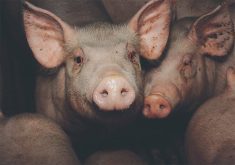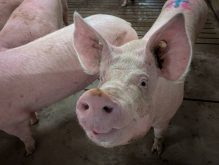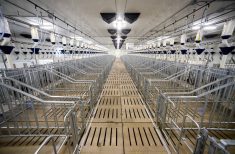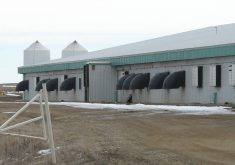The pork sector will not have to wait long for action items to come out of a new working group to reduce PED (porcine epidemic diarrhea).
Cam Dahl, general manager with the Manitoba Pork Council, says the multi-stakeholder group is already meeting, and he expects recommendations to start flowing in by late spring or early summer this year.
“This isn’t something that’s going to be a long time,” he said, noting the need to get things in place, for example, there might be improvements needed around manure-spreading practices.
Read Also

KAP flags risky trade for Manitoba farmers
Tariffs, market access uncertainty, trade diversification and export infrastructure top the agenda at Keystone Agricultural Producers (KAP) annual meeting.
Why it matters: The infamous neonatal disease is linked to 80 to 100 per cent losses of piglets in the first two weeks of life and comes with a serious financial and morale hit for any infected barn.
The Manitoba Pork Council recently announced the value chain working group, in the hopes of honing industry practices to prevent PED spread.
Manitoba saw its third major outbreak of the viral disease starting in late 2021. As of Feb. 11 this year, 74 new cases had been reported during the 2021-22 outbreak. It was also the first time cases rose so sharply over the winter, with previous outbreaks peaking during the warmer seasons.
While the virus was first detected in the province in 2014, cases were sporadic until 2017, when Manitoba’s first major fight with PED racked up 80 cases. That record was broken in 2019, when 82 cases were reported. Between those years, the sector had enjoyed lulls, with relatively few new cases reported.
It’s a pattern that has not escaped industry experts. The apparent cycle has led to veterinarian speculation around waning immunity following outbreak years or herd turnover, although industry is still working to determine definitive causes.
It is the pork council’s hope that the working group will help break the pattern.
“The agreement is that we can’t keep doing this every two years,” Dahl said. “So what are those approaches that can be used and where are the holes in what we’re doing currently? What can we do, whether it’s communication, whether it’s improvements in biosecurity around trucking, for example, or other service providers?… Are there additional alternative approaches that can be used to control the disease?”
Herd veterinarians, producers (both those who have experienced PED and those who have dodged the issue so far) and Manitoba’s office of the chief veterinary officer are among those making up the core working group.
“We have the view from the integrated operations, the view from independent operations, the view from the veterinarians,” Dahl said.
Other resources will be called to augment that core group, he noted. Part of that will include the Western College of Veterinary Medicine, which has been tapped to explore PED management in other regions and how those practices might apply to Manitoba.
Those recommendations are expected by the end of March.
The “billion-dollar” long-term solution would be an effective vaccine for naive herds, he noted, although he added that most options right now have been most effective in barns that have already been infected.
Dahl expects that the purposeful inclusion of so many viewpoints in the industry will help dissect potential practices and their effectiveness to the sector by large.
“One of the goals is to kind of have everybody take their hat off when they come to the table and look at what’s in the best interest of the industry and we’re really seeing that; we really are,” he said.
“Are there different ideas and different potential approaches out there? Absolutely. Are we going to talk about them? Yes. Is that going to be a barrier to the industry coming forward with a common position? No, I don’t think it is,” he added. “I think that that’s the real advantage of having an industry that’s already used to working together on issues.”
The working group is separate from the Manitoba High Traffic Facility Swine Disease Surveillance Project, which received provincial funding in late February, although Dahl noted that the group will be looking at results from that project. The project, which tests for PED at high-volume pork sites, will “allow more time to evaluate fully the mitigation efforts taken by the swine sector that have decreased the occurrence of PED,” a February newsletter from the Manitoba Pork Council said.
















